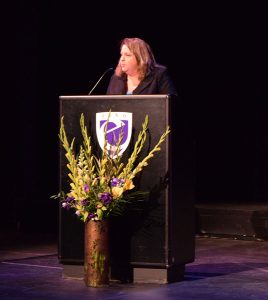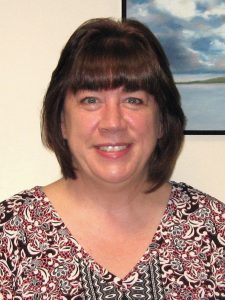Emerson Faculty ‘Honored’ and ‘Overwhelmed’ to Receive Teacher Awards
Steve Himmer, senior lecturer and First-Year Writing Program director, accepts Emerson College Alumni Award for Teaching Innovation at a ceremony held in the Semel Theater on April 5.
By David Ertischek ’01
A record 305 nominations were submitted for this year’s Emerson College Teacher Awards, which were whittled down to three faculty members to receive the prestigious awards.
- Laura Glufling-Tham, director of clinical education in Communication Sciences and Disorders, was honored with the Helaine and Stanley Miller Award for Outstanding Teaching for showing remarkable dedication and creativity, and for encouraging students to master their fields of study.
- Angela Anderson-Connolly, affiliated faculty in Journalism, was honored with the Alan L. Stanzler Award for Excellence in Teaching for being an outstanding teacher.
- Steve Himmer, senior lecturer and First-Year Writing Program director in Writing, Literature and Publishing, was honored with the Alumni Award for Teaching Innovation for engaging students in active learning in and out of the classroom, and for fostering a stimulating and creative learning environment.
Winners were selected after a review by the Deans’ Council, the Gold Key Honor Society officers, and consultation with either the donors of the awards, Helaine Miller and Alan Stanzler, or the Leadership Committee of the Alumni Board.
In a letter to students and faculty, Provost and Vice President for Academic Affairs Michaele Whelan said the awards “exemplify excellence in teaching, and the record 305 nominations we received this year attest to our collective commitment to this value.”
Click here to read more about the awards and past winners.
This year’s award winners fielded questions from Emerson Today:
What does it mean to you to be recognized by students and faculty as one of three teachers to win a Teaching Award?
Himmer: It’s an enormous honor. To be recognized is an honor in itself, but knowing the award arises from nominations offered by students who found my classes valuable makes it really special.
Anderson-Connolly: I am a bit overwhelmed by the recognition. I have never been one to work for awards or accolades. I am honored by the recognition, and I hope it means that I have had an impact on the students at Emerson College, as they have had an impact on me. It also reinforces the work I have done to become a better teacher.
Glufling-Tham: I am truly honored to have been nominated for this award and have won this award. I love teaching students and helping them engage both with research-based information as well as the clinical application of this research into their practice as future speech-language pathologists. I work with a group of colleagues, both academic and clinical faculty, and we are all dedicated to helping the students learn about a variety of child- and adult-based disorders and how to evaluate and treat individuals who present with these disorders. I am so thankful for the support and encouragement of the department to support my teaching.
You were recognized for “engaging students in active learning in and out of the classroom.” What do you think are the keys to engaging students in, and out, of the classroom?
Himmer: One of the many things I enjoy about working with Emerson students is that each time I teach a course I’ve taught before, I can increase the challenge, and students rise to it. They’re always showing me what they’re capable of and pushing me to grow as a teacher. Engagement comes from that challenge, and also from assignments and courses that balance introducing material [that] it’s important for students to learn with creating space to take charge of their own curiosity and passions to guide that work. When classes are most engaged, I think it’s because we’ve come together to get that balance right so each student can connect to what I’m requiring them to do in a personally meaningful way.
What do you think are your keys to being an excellent teacher?

Anderson-Connolly: I truly care about my students and their success, and I am not afraid to let them fail and make mistakes. It is often the best time to learn. I connect with my students and the relationship often extends outside of the classroom, and I stay in contact with many students even after graduation. I never stop learning and improving as a teacher. I take courses, make adjustments to courses based on student evaluations, and do my best to keep up with the industry and technology.
You were recognized “for showing remarkable dedication and creativity, and for encouraging students to master their fields of study.” What do you do to encourage students to master their fields of study?

In one class, we work through a case study about a young woman who sustained a stroke and who is now presenting with cognitive-linguistic impairments that have affected her ability to live alone and return to work. The students have to watch a pre-recorded video of the woman being interviewed and they have to practice making observations and taking notes live (as they only see the video once). Then based on the intake information that I provide them with her medical and biographical background, the students must generate a hypothetical diagnosis about what disorder they believe the client presents with. Next, I share real test scores and the students then have to analyze these scores, make therapy recommendations based on this information, and then research and generate treatment objectives and activities that will help the woman improve her cognitive-linguistic skills. The students work on clinical writing and problem solving both in a group and individually. These are all skills that they need to learn and use in clinical placements.
Is there anything else you’d like to share about winning an Emerson Teaching Award?
Himmer: Just to repeat how deeply honored I am, and how much it means to me to know I’ve offered something to students that led them to say so in this way. That’s a wonderful, humbling feeling.
Anderson-Connolly: I was honestly surprised by the award, and the reaction I have gotten has been amazing. As an alum of Emerson College I know how special this school really is and I am honored to be part of the affiliated Faculty. The students are amazing, and I know the future of journalism is very bright.
Glufling-Tham: I am again honored by this award and hope to continue teaching our students.
Categories